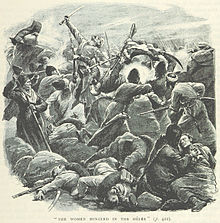Battle of Geok Tepe (1879)
| Battle of Geok Tepe (1879) | |||||||
|---|---|---|---|---|---|---|---|
| Part of Russian conquest of Central Asia | |||||||
 Battle of Geok Tepe 1879 |
|||||||
|
|||||||
| Belligerents | |||||||
| Akhal Teke Turkmens |
|
||||||
| Commanders and leaders | |||||||
| Berdi Murad Khan † Kara Bateer † |
|
||||||
| Strength | |||||||
| about half the population of the tribe sheltered in the fortress about 20,000 people |
|
||||||
| Casualties and losses | |||||||
| 2,000+ killed 2,000+ wounded |
250+ wounded |
||||||
Turkmen victory
The First Battle of Geok Tepe was the main event in the 1879 Russian expedition against the Akhal Tekke Turcomans during the Russian conquest of Turkestan. Lomakin marched 275 miles to the Goek Teppe fortress, mismanaged the attack and was forced to retreat. Next year, this was reversed by Skobelev by the second Battle of Geok Tepe.
Geography and Background: After Russia subdued the Khanate of Bukhara in 1868 and the Khanate of Khiva in 1873 the Turkoman desert nomads remained independent. Their country was bounded by the Caspian Sea on the west, the Oxus River on the east and the ill-defined Persian border on the south. Near the center the Kopet Dag mountains ran northwest almost to Krasnovodsk Gulf. On their north side streams ran down from the mountains forming the Akhal Oasis which, in the broadest sense, ran from Kazil Arbat to beyond Askabad. The Tekke Turkomans who lived here were one of the few Turkoman tribes who practiced agriculture. Before and after the conquest of Khiva expeditions were sent into the Turkoman country to map the area and find the waterholes that would be needed by any significant army. In the spring of 1878 Lomakin was driven back from Kazil Arvat and that fall he crossed the Kopet Dag and was chased all the way back to Chikishlyar. These defeats had to be avenged, if only as a matter of prestige.
Buildup: General Lazerev was given command, replacing the unsuccessful Lomakin. He assembled 18000 men and 6000 camels at Chikishlyar. He planned to march northeast through the desert along the Atrek and Sumbar Rivers and establish a large supply base in the mountain valley of Khoja Kale before crossing the Kopet Dagh to conquer Akhal and possibly Merv. The distance was 344 km to the mountain pass and then 117 km southeast along the oasis to Geok Tepe. Because Chikishlyar was a beach and not a harbor, landing supplies was slow. The place was unhealthy and this was the worst time of the year to march in the desert. It was difficult to find enough water and fodder for such a large force. One of the civilians who supported the army was a Mademoiselle Pauline who accompanied the troops all the way to Akhal and earned 4000 rubles during the campaign.
...
Wikipedia
